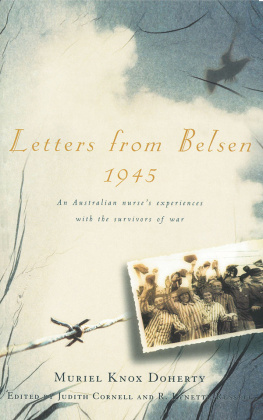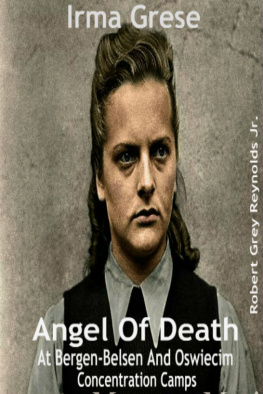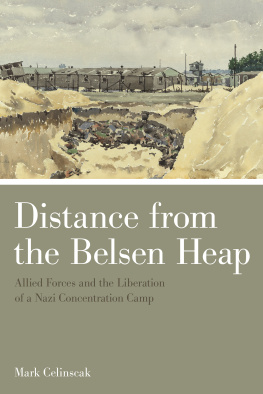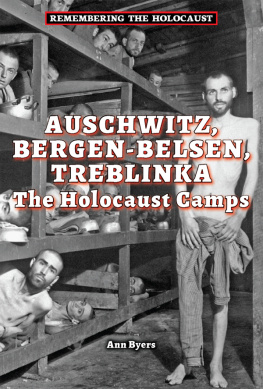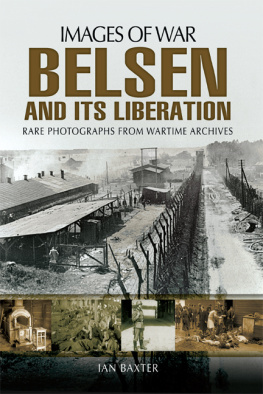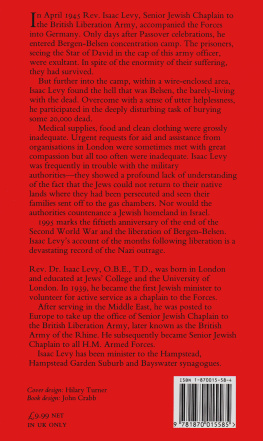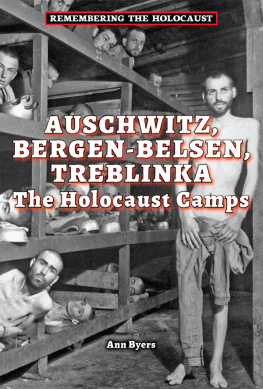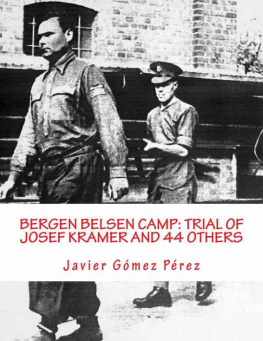Copyright NSW College of Nursing 2000
All rights reserved. No part of this book may be reproduced or transmitted in any form or by any means, electronic or mechanical, including photocopying, recording or by any information storage and retrieval system, without prior permission in writing from the publisher.
Every effort has been made to contact copyright holders of photographs reproduced in this text. In cases where these efforts were unsuccessful, the copyright holders are asked to contact the publisher.
First published in 2000
Allen & Unwin
83 Alexander Street, Crows Nest NSW 2065 Australia
Phone:(61 2) 8425 0100
Fax:(61 2) 9906 2218
Email:
Web:http://www.allenandunwin.com
National Library of Australia
Cataloguing-in-Publication entry:
Doherty, Muriel Knox.
Letters from Belsen 1945: an Australian nurses experiences with the survivors of war.
Includes index.
ISBN 978 1 86508 222 6
eISBN 978 1 76063 692 0
1. Doherty, Muriel KnoxCorrespondence. 2. Bergen-Belsen (Concentration camp). 3. World War, 19391945Concentration campsLiberationGermanyPersonal narratives, Australian. 4. NursesAustraliaCorrespondence. I. Cornell, J. A. Judith A.). II. Russell, R. Lynette. III. Title.
940.53180943593
Set by DOCUPRO, Sydney
Cover design: Scooter Design
Cover photographs: National Archives (US), courtesy of USHMM Photo Archives (photo also reproduced on title page and chapter opening pages); photolibrary.com; Doherty Collection, New South Wales College of Nursing Archives, Sydney, DC/PB13
FOREWORD
MANY BOOKS, PAPERS, SEMINARS, courses and degrees have been devoted to an examination of the Holocaust and to the placement of survivors of the concentration camps. But what of those survivors who were not fit to be moved or who had no place to go? We have heard little of them.
Letters from Belsen 1945 fills that gap. We must be grateful to Muriel Knox Doherty for being a constant and remarkable correspondent, and for keeping copiesa not inconsiderable task in the days before word processorsand making them available to posterity. Her life was concerned with helping others and ensuring good nursing practices wherever she went. She always desired to be in the thick of things and so, in 1945, she joined the United Nations Relief and Rehabilitation Administration (UNRRA) and was appointed Chief Nurse and Principal Matron of the Bergen-Belsen Concentration Camp.
Miss Doherty had wonderful powers of observation and an ability to transfer them, as well as her difficulties and joys, onto paper. In her letters, she finds time to describe the conditions of Belsen on its liberation by the British. This is the only time that she gives a second-hand account but her description is riveting. No matter how often one hears or reads of the way people were treated in these camps, the horror does not lessen. She describes the difficulties of formulating a suitable diet for people who had been deprived of decent foodsome for yearsand people who were literally starving at the time of liberation. These accounts of the conditions before she arrived augment her own story and give us a picture of the utter desolation in which the survivors lived and died.
The job Miss Doherty took on seems insuperable. But she had proved throughout her life to be adept at solving apparently impossible problems. She was able to design a hospital, staffed by a polyglot population of nurses and patients. The patients, in varying degrees of ill health, were suffering from starvation, typhus and Tb among other things. The hospitals were ill equipped, without even sufficient blankets for the beds (partly explained by the appearance of people in grey flannel suits!). The DPs, even more, suffered from the hopelessness of their position. Miss Doherty attempted to make them feel as at home as possible and to do as much for them as she could. She had huge compassion and understanding for people who had been through hell and were having difficulty escaping from its memory and its effects.
She was deeply affected in particular by the plight of the Jewish survivors. Her description of the trials of the war criminals from Belsen and Auschwitz held in Luneberg is both compelling and horrifying. She attended the trials for only one day but the impression they left on herand hence on the readercould never be obliterated. She manages to convey her disgust at the enormity of what these people had done and leaves no doubt in the readers mind of the arrogance and guilt of those accused.
Miss Doherty was a woman of selfless courage, wit and determination. She made an overcrowded hospital with very little equipment and personnel into a place where patients could recover their self respect, their traditions and their health. Her eyewitness accounts of her experiences at Belsen give the lie to those who attempt to deny that the Holocaust ever happened.
Cornell and Russell have done a great service by editing and publishing Miss Dohertys letters. Miss Doherty is so well able to show compassion, to convey her anger and disgust at the behaviour of the Nazis and others, and to describe with humour what must have been extremely difficult situations. It seems extraordinary to me that she ever found time to write her letters. But she was a woman who regarded everything she did as important. It seems to me likely that she needed to write her letters both to ensure that people would understand the situation and as an outlet for her feelings.
Anyone involved or interested in the Holocaust, in nursing, in courage and ability, will benefit by reading this book.
Vivianne de Vahl Davis BA PhD was a founding member of the Breast Cancer Action Group (NSW) and a Senior Lecturer in Communications at the University of Technology, Sydney, where she taught bioethics to nurses
These letters are dedicated to the countless millions who suffered and died in Europevictims of the German New Order.
M. K. Doherty, Sydney, 1949
THIS BOOK BRINGS TOGETHER the complete collection of letters written by Muriel Knox Doherty to her friends and relatives during her time as the Chief Nurse and Principal Matron of the recently liberated Bergen-Belsen Concentration Camp. Some preliminary editorial work had been carried out on these letters by Miss Doherty following her return to Australia, when she was attempting to gain their publication. At this time she selected which of her letters she wished to be published and this selection has been respected by us.
In editing the letters, we have made every attempt to retain the flavour and style of Miss Dohertys writing. We have changed little, apart from standardising numbers and dates, correcting punctuation and the odd spelling mistake, or altering paragraphing. We have corrected grammar only where there was a glaring mistake or an obvious ambiguity in expression. Spelling that follows the conventions of the time has been retained throughout. Miss Dohertys original text contained many exclamation marks, double exclamation marks and underlined wordsmany of these have been deleted. Wherever possible we have listed at the beginning of the book the meanings of the abbreviations used by Miss Doherty throughout the text.
We have chosen to use the name Miss Doherty throughout, instead of Murielshe would have found the use of her first name by anyone but close friends and relatives offensive. Miss Doherty has therefore been used out of respect for this belief.

